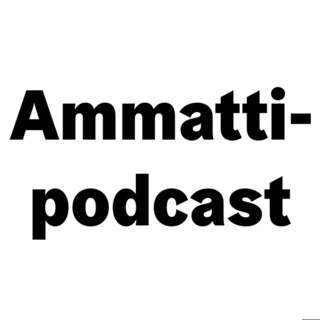
20VC Roundtable: Spotify, Adobe & Linkedin CPOs on How AI Changes The Future of Product, Why AI is Now the Product, How TikTok Changed Product, Why Cost is the Biggest Barrier to LLM Usage & Why Incumbents Can Adopt AI Faster Than Any Prior Innovation Cyc
Gustav Söderström is the Co-President, CPO & CTO at Spotify. Gustav has been instrumental in taking Spotify from a 30-person operation in Sweden when he joined to being the global leader of the space. Scott Belsky is Adobe's Chief Product Officer and Executive Vice President, Creative Cloud. Scott oversees all of product and engineering for Creative Cloud, as well as design for Adobe. Tomer Cohen is the Chief Product Officer @ Linkedin where he is responsible for setting and executing the global product strategy at LinkedIn. In Today's Episode on How AI Changes The Future of Product and Design We Discuss: 1. Why AI Is Now the Product that UI Serves: Why does Gustav believe that AI is now the product? How has the importance of UI changed with the rise of AI? How did TikTok change the product paradigm over the last few years? 2. What Matters More Models or Data: What is more important the size of the model or the amount of data a company has? Will companies use many models at the same time? Why will companies using many models at once create a huge opportunity for startups? Will every company have their own model? What will be the decision-making framework of whether to have your own model or leverage another? How does the rise of AI change how companies approach data acquisition, collection and cleaning? 3. The Workforce Needs to Change with AI: How do product leaders and teams need to change in an AI-first world? What do designers need to do to stay up to date in an AI-first world? What does it mean to be good at prompting? How can people get good at prompting? Why will AI kill companies that charge by the hour? Why will seat pricing die in a world of AI? What will be the business model for AI? 4. Incumbents vs Startups: Who Wins: Do incumbents win in a world of AI or do startups? Why is AI primed for incumbents to win and move fast in a way they could not in prior technology cycles? What are the biggest hurdles and challenges incumbents have to face that startups do not? What are the biggest barriers that startups have to win in a world of AI that incumbents do not have?
20 Joulu 202350min

20VC: Why Now is the Best Time to Invest in Emerging Managers, Biggest Mistake Emerging Managers Make When Fundraising & Investing Lessons from Investing $1.5BN Per Year and Being Early Investors in Thrive, a16z and Founders Fund with Peter Lacaillade
Peter Lacaillade is a Managing Director @ SCS Financial Services where he leads its private investment program where he oversees the firm's activities in private equity, opportunistic credit and private real assets. Peter has been an early backer of Thrive, Founders Fund, a16z, Greenoaks and 20VC. Before SCS, Peter was an Associate at HarbourVest Partners in its Secondary Group where he analyzed venture capital, growth equity and buyout investments. In Today's Episode with Peter Lacaillade We Discuss: 1. Becoming One of the Great LPs in Venture: How did Peter make his way into the world of fund investing as an LP? What does Peter know now that he wishes he had known when he started as an LP? Why does Peter believe now is the best time to be investing in newer, emerging managers? 2. How to Pick the Best Venture Managers: What are the commonalities in the best VCs Peter has invested in? How important is track record for Peter when evaluating managers? What mistakes has Peter made when it comes to manager selection? What did he learn? How do the best managers build relationships with their LPs? 3. Building a Portfolio That Can 5x: In a venture fund portfolio, what is the distribution between those that outperform, perform as planned and then underperform? How does Peter invest in both large franchises and emerging managers with a barbell approach? How much in established franchises and how much in emerging managers? Are managers actively marking down their portfolios in the last 18 months? Who has been the best at this and who has been the worst? How much should portfolios be marked down? How does Peter evaluate the compression of deployment timelines we saw in the last 18 months? 4. A Breakdown of the LP Landscape: Family Offices: What are the biggest dangers of having family offices as LPs? Why do multi-family offices tend to be better? Endowments: Are they really as stable as people think they are? What separates a good vs great endowment? Who stands out? Fund of Funds: Why does Peter think fund of funds deserve more credit? How should managers think about working with FoFs most effectively? What is the right level of concentration managers should have between these different LP profiles? What are the biggest mistakes emerging managers make when approaching LPs?
18 Joulu 20231h 2min

20VC: Cotopaxi: From Selling $6M of Pool Tables to Scaling $150M in Revenues and Challenging Patagonia, Fundraising Lessons from 100+ Rejections & What Founders Do Not Understand About VC with Davis Smith, Founder @ Cotopaxi
Davis Smith is the Founder and Chairman of Cotopaxi, an outdoor brand with a humanitarian mission. The company has assisted over 4 million people living in poverty. The company has been profitable for the last 4 years and is expected to do $160M in revenue in 2023, up from $55M just two years before. In April 2023, Davis resigned after 10 years as CEO to lead a mission for his church in Brazil for three years. Davis is an EY Entrepreneur of the Year and was recognized as Utah's Businessperson of the Year in 2022. He is an adventurer who has floated the Amazon on a self-made raft, kayaked from Cuba to Florida, and explored North Korea. In Today's Episode with Davis Smith We Discuss: 1. From Selling $6M Worth of Pool Tables to the Amazon of Brazil to Founding Cotopaxi: How did Davis scale a pool table business to $6M in revenue? What were Davis' biggest takeaways from building the Amazon of Brazil, raising millions in VC funding and the business failing? How did depression and 36 hours on a sofa lead to the a-ha moment for Cotopaxi? 2. The Billion Dollar Company, Rejected by 100 Investors: How was the early fundraising journey for Davis with Cotopaxi? Why did so many investors say no? What was the best VC meeting he has ever had? Why do women understand Cotopaxi better? What does Davis believe are the biggest misalignments between VCs and Founders? Why does Davis believe we need a new type of financial product to fund long term projects? What are the biggest elements of fundraising that Davis believes founders do not understand? 3. Scaling Cotopaxi to $150M in Revenue: What are Davis' biggest lessons on what works and what does not from scaling Cotopaxi to $150M in revenue? Why did Davis not lay anyone off but decide everyone should take a pay cut instead? How did that go down? Why does letting people leave work earlier lead to better talent wanting to join your company? Why does Davis believe that you absolutely can build a huge business with balance in your life? 4. Life, Parenting, Marriage: Why does Davis believe that so many entrepreneurs chase the wrong thing? What do they chase? What should they be chasing instead? How does Davis analyze his relationship to money today? Does it make you happy? What does great parenting mean to Davis? How has that changed over time? How does marriage change when comparing pre-kids and post-kids? Was Davis nervous about becoming a father for the first time at the age of 24?
15 Joulu 202358min

20Sales: How to Close Sales When Selling to CFOs, How to Guarantee You Win Every Renewal, Core Questions All CFOs Ask Today When Buying, Why Revenue Operations is the Most Important Role in a Company with Steve Goldberg, CRO @ Salesloft
Steve Goldberg is the Chief Revenue Officer at Salesloft, the sales engagement platform that was acquired by Vista in 2022 for $2.3BN. Prior to Salesloft, Steve was Group Vice President of Enterprise at Yext and before that was a Senior VP @ InsideSales.com. In Today's Episode with Steve Goldberg: 1. Becoming a Sales Leader: When did Steve first fall in love with sales? Why does Steve believe sales is more psychology than anything else? What can sales reps do to master the psychology of their prospects? What does Steve know now about sales that he wishes he had known in the beginning? 2. How to Close Prospects Faster Than Ever: How does Steve build relationships with prospects very fast? What questions does he ask? How does Steve know if he is really speaking to a buyer? What are the signals? How does Steve advise sales reps on getting multiple relationships within an account to prevent the potential of losing your champion? How does Steve feel about discounting? When is the right time to do it? 3. How To Do The Best Deal Reviews: What makes good vs great deal reviews? Who is invited? Who is not? Who sets the agenda? Who is responsible for what? How do deal reviews change throughout the quarter and throughout the year? Is a deal slipping into the next quarter an acceptable excuse for a sales rep to give? 4. How to Ensure Renewals in a World When They are Not Guaranteed: Have all budgets centralized back to the control of the CFO? Are people right to say that no CFOs are buying new technology today? What is the best way to show to customers the value you provide? Why does Steve believe revenue operations is the most valuable role within an org?
13 Joulu 202349min
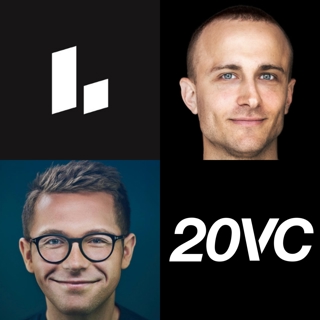
20VC: Why Founders Should Take as Many VC Meetings as Possible, Should Founders Meet Associates, How to Get Intros to the Best VCs, How To Extract the Most Value From Your Investors, Why Post IPO Operators Are the Best Angels with Sam Corcos @ Levels
Sam Corcos is the Co-Founder & CEO @ Levels, the company helping you see how food affects your health with data from biosensors like continuous glucose monitors (CGMs). To date, Sam has raised over $89M for Levels from the likes of a16z (Jeff Jordan sits on his board), Founder Collective, Breyer Capital and Shrug Capital to name a few. Prior to Levels, Sam founded two prior companies, CarDash; a Y Combinator company that makes automotive repair and maintenance convenient. Before Cardash, Sam founded, Sightline Maps, an intuitive platform for 3D printing and visualizing topographical maps, marketed primarily towards the U.S. military. In Today's Episode with Sam Corcos: 1. The Founding Moment: What was the a-ha moment for Sam with the founding Levels? What were the big mistakes Sam made with prior companies that he did not take with him to Levels? What does Sam know now that he wishes he had known when he started Levels? 2. How to Fundraise Like a Pro: Why does Sam believe that founders should take as many meetings with VCs as possible? What are the biggest mistakes founders make when meeting investors? Should founders meet with associates in the fundraising process? What does Sam mean when he says, "you have to create theater" when pitching? 3. How to Extract the Most Value from Your Investors: What have been Sam's biggest lessons on how to put your investors to work? What is the right and most strategic way to ask investors for specific help? How can founders create a competitive environment where VCs are competing to help? Which investors have been the most helpful? Why are post-IPO operators the best angels to have as investors? How has the a16z platform team been such a needle mover? 4. How to Find Your Partner and Master Parenting: What does Sam mean when he says he had a "one pager" in what he wanted in a partner? What was in the one-pager? How did dates respond? What are the biggest mistakes people make when dating? What is Sam most nervous about on becoming a parent? How does Sam think having a child will impact his marriage?
11 Joulu 20231h 8min
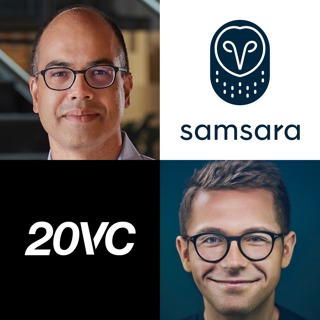
20VC: $18BN Market Cap and $1BN in ARR in 8 Years; Samsara | How to Find Product Market Fit Reliably | How to Create a Multi-Product Company | The Pros and Cons of Serial Entrepreneurship with Sanjit Biswas, Founder & CEO @ Samsara
Sanjit Biswas is the Founder and CEO @ Samsara, allowing businesses that depend on physical operations to harness Internet of Things (IoT) data. Over the last 8 years, Sanjit has scaled Samsara to $1BN in ARR and a public company with tens of thousands of customers. Before Samsara, Sanjit was the CEO and co-founder of Meraki, one of the most successful networking companies of the past decade. Sanjit grew Meraki from his Ph.D. research into a complete enterprise networking portfolio. Meraki's sales doubled every year from inception and in 2012, Cisco acquired Meraki for $1.2 billion. Huge thanks to Doug Leone for some fantastic question suggestions pre this episode. In Today's Episode With Sanjit Biswas We Discuss: 1. From Founding to $1BN in ARR in 8 Years: What was the founding a-ha moment for Sanjit with Samsara? Sanjit sold his prior company Meraki for $1.2BN, what worked with Meraki that Sanjit took with him to Samsara? What did not work that he left behind? What does Sanjit know now that he wishes he had known when he started Samsara? 2. The Man Who Found Product Market Fit Time and Time Again: What is the one single moment that Sanjit believes you know you have product market fit? What are the biggest mistakes founders make when chasing product market fit? How does being a bootstrapped company change how a company approaches chasing PMF? 3. Mastering a Multi-Product Company: How do you know when it is the right time to launch a second product? Does the second product have to make the first product better? What are the biggest mistakes companies make when going multi-product? 4. The Art of Great CEOship: Does Sanjit believe that the best CEOs are the best capital allocators? What has been the single best and single worst capital allocation decision in Samsara's journey? What are the biggest mistakes Sanjit has made in leadership? How did he learn and grow from them?
8 Joulu 202353min
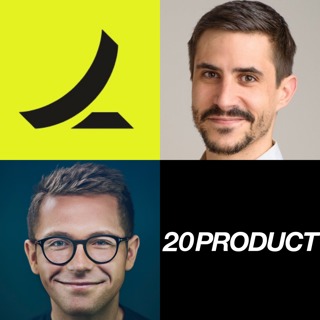
20VC: Ramp's Product Playbook: How To Hire Product Teams, How to Run Sprints, How to Increase Product Velocity, When and How to Go Multi-Product with Geoff Charles, VP Product @ Ramp
Geoff Charles is the VP of Product at Ramp, leading the product management, operations, and support teams. Prior to Ramp, Geoff helped spin off Mission Lane and scale credit products to millions of consumers. He started his career advising Fortune 100 financial services companies. In Today's Episode with Geoff Charles We Discuss: 1. How to Become a Product Leader: How did Geoff make his way into the world of product? What are the single most important skills for product people to learn early? What are the biggest mistakes that product people make early in their career? 2. When and Who to Hire for the First Product Team: When is the right time to hire your first product people outside of founding team? Why are the best product teams in the early days professional services teams? What is more important; the person has stage or sector experience, when joining? Should you hire senior product people or junior product people as the first hires? 3. How to Increase Velocity Using Sprints: How does Geoff and Ramp use two-week sprints to have insane product velocity? How are they structured? How are goals set? Who is included? What makes a good vs a bad sprint? How is accountability tied to sprints? When do two-week sprints no longer become possible? What happens then? 4. Going Multi-Product, Will Incumbents Kill You and Product Re-Usability: When is the right time to add a second product? What are the biggest mistakes companies make when going multi-product? Why is it unlikely that an incumbent is the one to kill you? What competitor should worry you? What does Geoff mean when he speaks of "product re-usability"? Why is it crucial to velocity?
6 Joulu 202352min
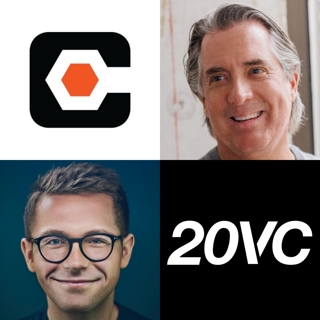
20VC: From Construction Worker to Billionaire CEO; The 21-Year Epic Journey of Procore to an $8.6BN Company, Advice from Tobi at Shopify on Being a Great CEO & Why The Idea of "Becoming an Entrepreneur" is BS with Tooey Courtemanche
Tooey Courtemanche, Jr. is the Founder, CEO, President, and Chairman of the Board of Procore. He founded Procore in 2002 with a mission to connect everyone in construction on a global platform. After 13 years of business, the company had just $9.6M in revenue, 8 years after that they have over $890M in revenue. Under his leadership, Procore has grown to become a leading global provider of construction management software, connecting over 2 million users across 150+ countries. Today Procore trades on the New York Stock Exchange under the ticker PCOR. Huge thanks to Brian @ Bessemer and Will @ Iconiq for some amazing question suggestions today. In Today's Episode with Tooey Courtemanche: 1. The Founding of a $8.5BN Company: How did Tooey's wife, Hilary and their house-building lead to the idea for Procore? What does Tooey know now that he wishes he had known when he started? Did Tooey always know he would be a success? What was the moment of most doubt? 2. The 13-Year Journey to $9.6M in Revenue: Why did it take so long to hit the $10M revenue mark? What changed in 2015? What is Tooey's biggest advice to founders and investors who face market timing risk? Why was Tooey laughed out of VC offices in 2008? What are his biggest pieces of advice to founders raising from VCs today? How does Tooey advise founders on the balance between vision and sticking to a mission vs realising when it is not working and giving up? 3. The Art of Great CEOship: What advice did Tobi @ Shopify give Tooey on being a great CEO? How did it impact his approach? What are the biggest differences between the reality of being a CEO and the Instagram version? What have been Tooey's biggest lessons on hiring? Why does hiring smart, ambitious but not humble people never work? Why does Tooey believe the idea of "becoming an entrepreneur" to be BS? 4. Parenting, Money and Marriage: Why does Tooey believe great parenting is like great CEOship? How does one bring up children to be ambitious and humble in a very privileged upbringing? What are the secrets to being there as a husband while also being a rockstar CEO? How does Tooey reflect on his own relationship to money and wealth today?
4 Joulu 20231h 14min



















